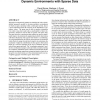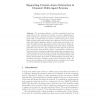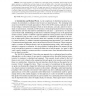45 search results - page 3 / 9 » Learning of coordination: exploiting sparse interactions in ... |
SASO
2008
IEEE
13 years 11 months ago
2008
IEEE
In biology, many organisms coordinate their interactions in a self-organizing and emergent way solely by means of indirect communication based on chemical substances. These so-cal...
ATAL
2007
Springer
13 years 11 months ago
2007
Springer
This paper investigates the problem of estimating the value of probabilistic parameters needed for decision making in environments in which an agent, operating within a multi-agen...
E4MAS
2004
Springer
13 years 10 months ago
2004
Springer
The increasing ubiquity of mobile computing devices has made mobile ad hoc networks an everyday occurrence. Applications in these networks are commonly structured as a logical netw...
ISPE
2003
13 years 6 months ago
2003
A two stage approach to co-ordination in a multi-agent society is presented. The first stage involves agents learning to co-ordinate their activities based on local and global uti...
ATAL
2003
Springer
13 years 10 months ago
2003
Springer
Large systems of agents deployed in a real-world environment face threats to their problem solving performance that are independent of the complexity of the problem or the charact...



